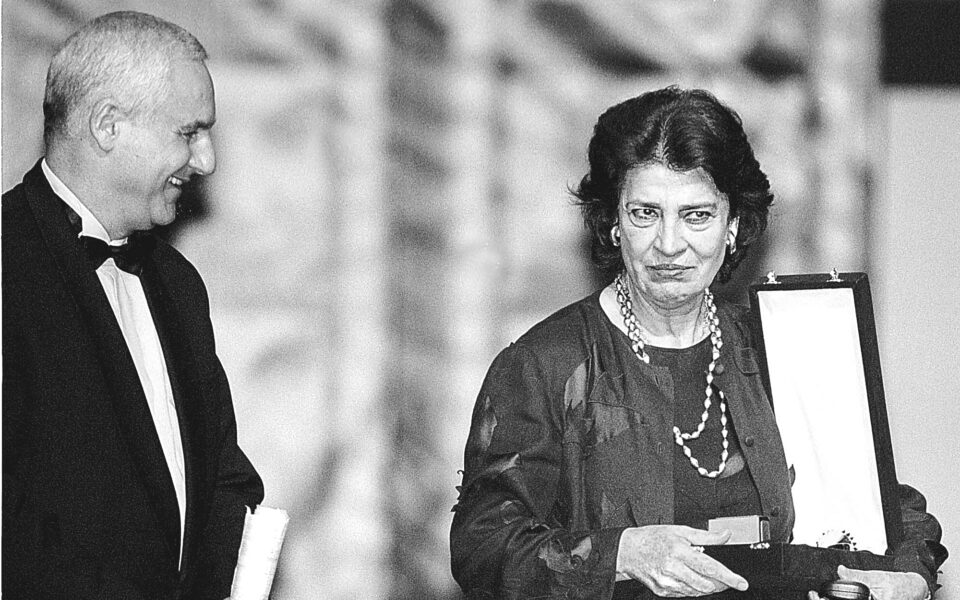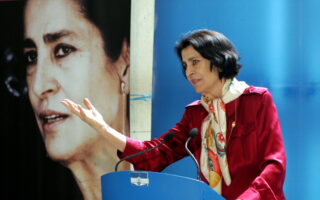Uncompromising, generous, with a vision

What do the people who worked with Irene Papas remember of her? What has stayed with them? What did people feel when they saw her for the first time or met her?
Asked to remember something from the time she spent as a 13-year-old working with the great actress in the title role of Michael Cacoyannis’ “Iphigenia” (1977), Tatiana Papamoschou hesitated for a moment. But soon she descride a woman older than her who put her stamp on things, who was not just a beautiful woman and a good protagonist, but who combined such virtues with her mind and will. “She was a free person who questioned the status quo and conventions, in art and in life,” Papamoschou told Kathimerini. “Even the fact that she wanted to rehearse barefoot means something: a person who wants to feel the earth under her feet.”
Papamoschou also spoke of a warm, generous and self-deprecating person: “I remember it like it was yesterday, saying to her, ‘Oh, what a beautiful thing you are wearing!’ and her replying: ‘Take it! I’ll give it to you!’” It was a generosity that seems to be rare among people, she continued. “Papas in particular was a goddess, not only because of her acting ability or her figure, the ideal Greek woman. It was also her incredible personality, the personality of an uncompromising person. It was her beautiful mind, the fact that she questioned things, was open to challenges and discussions. I remember her endless conversations at that time with Kostas Kazakos (the actor played Agamemnon in “Iphigenia”) and with Cacoyannis, where you could see that they were interested in looking deeper into things, into art, but also into life.”
The painter, stage designer and costume designer Yannis Metzikof added a more personal touch to the image of Irene Papas. “I will always remember her as a wild, beautiful, black horse,” he told us. “Like a person with a vision, who wanted to bring the best theater teachers to our country, and that is why she focused all her efforts to build this special place (the Irene Papas School of Athens, where the Drama School and other activities of the National Theater are housed).”
“She had a hard time achieving it. But of course – both then and now – Greece is a country where such visions cannot easily find the right environment,” he said. “Irene Papas was a very important chapter of my life. [She was] a story that taught me a lot and left an indelible mark on me. As a young person – when I first met her – I learned from her; that we can reach far and wide with our hearts, we can evolve, always within the framework of our decisions and our honest goals. She had an incredible passion for life. Even today, I very often refer back to her own words when teaching youngsters.”
After all the above, the description of Irene Papas by famed writer and director Alekos Sakellarios seems more apt. In his autobiography he described how when he once saw her at Syntagma Square, it was “as if a Caryatid had come to life.” For his part, Michel Dimopoulos, who was the artistic director of the Thessaloniki Film Festival for several years, wrote in a book that accompanied a tribute to Papas in 1997, that “if [actress] Melina [Mercouri] personified passion and [actress Katina] Paxinou the moral breadth of this country, Papas is its depth, its pride and its tragedy.”
In a separate essay in that same publication, writer Kostas Georgousopoulos wrote: “There is something earthly about this wonderful beauty that looks almost like it is carved in ebony. Then again, you imagine that her figure escaped from the Attic vases, one time as a top dancer, another as a nymph at a cool spring, or as a mourner on a funerary hydria.”





